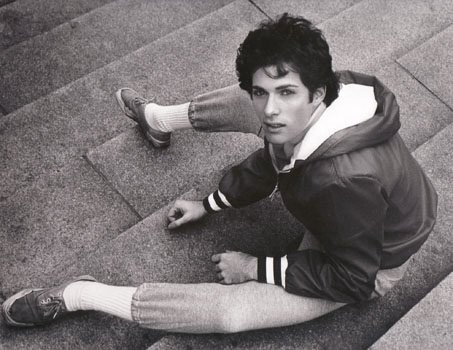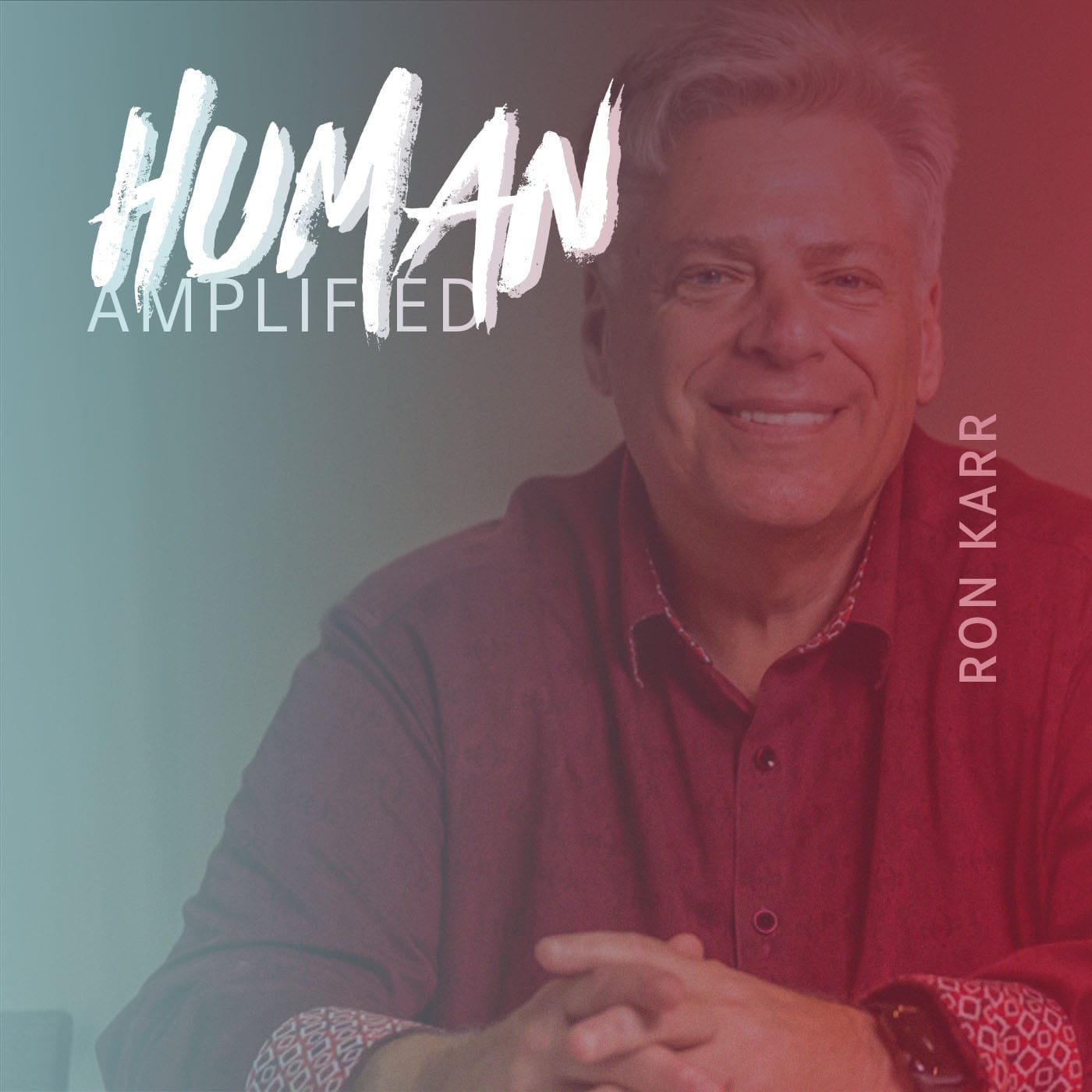Exploring Identity and Gender Constructs with Internationally-Acclaimed Children’s Book Author, Craig Pompranz
This is a conversation between Brandi Fleck, host of the Human Amplified podcast, and Craig Pomranz, a children book author who wanted to help families answer questions around not fitting into the gender binary with acceptance and love.
Craig Pomranz showing his children’s book, Made by Raffi, after reading an excerpt in his interview with Brandi Fleck.
I had the absolute pleasure of meeting Craig Pomranz over Zoom this Spring to not just chat, but to dive straight into the deep end about navigating and breaking down gender stereotypes - a topic Craig is well versed in as a godfather to a godson who was his real-life inspiration to tell the story of a boy who was different and needed to learn how to embrace who he was while gaining respect from his classmates.
Craig encouraged his godson to knit as a way to channel his creative, quiet energy, and his main character Raffi, takes us on not only a knitting journey, but one of support and acceptance while teaching our children to do the same.
We traverse the subject of gender stereotypes, or unwind the ball of yarn I guess you would say, by analyzing human nature and what reactions to the book say about the common thread of humanity across different cultures. We also learn about Craig’s personal experience that has given him perspective and wisdom along the way..
Ultimately, if identity is fluid, why can’t we embrace that?
Here’s what Craig thinks.
A Society Full of Labels
Craig, what does being human mean to you?
Wow, no small question.
It really does mean engaging and living with other humans without judgement. And I say that because trying to be non-judgmental is a good goal but it’s not an easy goal. It’s something we have to learn. I mean, we’re hard wired to categorize and be suspicious, and we live in a society full of labels, which is why I came out with my book. Labels in and of themselves are judgements.
So, I long for a less self-centered time and a more open and evolved time when we can just look at people and try and accept them for who they are and who they show us that they are.
Yeah, very nice, thank you.
Alright, Craig, welcome to Human Amplified. I’m really excited to have you here today and would love for you to introduce yourself to our readers, to our listeners - who you are, what you do, where you’re from. All of that.
So my name is Craig Pomranz. I’m originally from St. Louis, MO. I am based in New York City and I say that because I travel internationally as a vocalist, a signer, in nightclubs and as well as with my book. And I have written several children’s books. So I travel all around the world - I say that - mostly London and then in the United States, all over the United States.
You might also like: You Get to Decide What’s Right for You with Susan Ruth
The Made by Raffi Backstory
I love London. It’s so amazing.
I do too. So it’s all been a very interesting thing - I’m diving right in, I hope that’s okay - because part of what came from all of this, from writing children’s book, which was based on an incident with my godson, was discovering not only about myself and about him, but about he world and how basically, as we all like to say, we’re all basically the same people and this kind of a conversation crosses all cultures.
It’s a wonderful thing to see and also disturbing to see in different areas who is more evolved and who has sort of fallen backwards or has not been able to move forward in all these conversations.
That has been interesting to say the least.
I find that in the states as well. It’s not just an international thing. As we know, we go state to state and things are different even though ultimately we’re all the same. If we could just accept that part of it, then we could probably get past a lot of things.
Agreed! So you mentioned your children’s book. I want to try and describe what I think the synopsis is and you tell me if that’s a fair representation. Is it Made by Ra-fee or Made by Rah-Fee?
Rah-fee
Okay, so basically Raffi is different from accepted societal norms and gender roles, and as you said, this was prompted by something that happened with your godson (I saw this in a previous interview you did) where he asked his parents if there was such a thing as a Tom Girl. So then you as his godfather came in and encouraged him to knit to sort of get something of his own. And he ends up being really respected for all of the cool things he creates in his class room. Is that a fair description?
It’s fair.
I think that, what was interesting was… I think he was spending the night one night. He was talking about how at his school all the kids, they say “dude,” and they like rough play, and they like sports. And he had his sort of challenges. One of them was he didn’t like loud noise, and he liked to be quiet, and he liked art, and he liked music, and he felt very different. So I was trying to help him be more comfortable in his own skin.
I actually wanted to give him dancing lessons because I’m a dancer as well, but his parents didn’t want me to do that, but that’s probably another conversation.
But, I ended up giving him knitting and needles because he had an hour and a half bus ride to go to school, and so I thought it’d give him time to focus and things to do and to concentrate and he learned to love it.
This night, he happened to say to me, or to his mother, is there such a thing as a tom girl?
And there is no, there was no… he sort of coined that word, and it hit me immediately because a tom boy in this day and age is like a positive thing. She’s assertive. She can do things.
But the minute that I heard “tom girl,” I thought it immediately has this negative connotation to it and I just thought well this is a story that has to be told and why is that?
And then one of the fascinating things that we can go on to talk about, about the book was, it added all these layers to what the book meant and what it said to other people about gender stereotypes and what we do and how we behave.
So it was a really interesting learning curve for me as well.
You might also like: A Deep Dive into Southern Masculinity and Rage
Gender Roles and Repression
Can you dive in just a little bit deeper into why the story had to be told from the tom girl angle. Can you dive a little deeper into what those negative connotations are and why?
Yeah, I can, but one of the things that came from it was the concept of “why is feminine a negative thing” and why is it that girls are sort of are immediately raised with this lesser than idea of who they are in our society.
Because a tom boy, as I said, people sort of respect that idea. Whereas a tom girl, people think immediately, one of the problems is, immediately people go to a sexual identity, which this is not about. They go there, and then they also go, “well, he’s like a girl.” They use words like “sissy-ish” and stuff like that.
Then there comes a question, “what is… is having emotion, is that not masculine as well?”
And that was the point. Tom girl, what does that mean and what are those differences and why are they so negative? Because as I said, tom [boy] seems to be so positive, but the idea of like a boy being emotional or liking the arts or wanting to do… I don’t know if that makes it a feminine thing but that seems to be the issue, so it was complicated.
I quote Gloria Steinem a lot where she had said, ya know, I paraphrase: we’ve begun to raise our daughters more like our sons, but few have the courage to raise our sons more like our daughters.
And there’s so many issues even there. Because the question is, is it about the feminization of boys or is it about a sexuality identity? I think it’s both of those things, and why are any of those things bad, is the question.
How’s your godson doing today? How long has it been since that happened?
It’s a long time, and he’s actually… he understands his differences. We live in an urban area. I think that makes a very big difference. I imagine if you’re in a college town or any other urban area, it’s a lot easier to sort of, quote, end quote, be different.
And so he has his struggles, but not about who he is. So that’s the good thing. His struggles are just the regular struggles of like it’s a pandemic; I can’t get a job.
But other than that, I’m really proud that he sticks to who he is and is as authentic as anyone can be. And I think that is the struggle we all have our entire lives. He’s ahead of some of us.
That’s awesome. I’m glad to hear that he’s doing really well. So you had mentioned a little bit about identity and sexual identity. But where do gender roles fit into this discussion and are they harmful?
I don’t think - they’re not necessarily harmful in and of themselves. I mean I think that comfort with stereotypical roles is a perfectly fine thing. I think the problem is when people insist that there’s only one way to be and that they must conform to something and that there’s something wrong if you don’t, if you’re atypical. And also I think that we get lost in the idea of what social media and what social behavior says we should be and have.
And I think that, um, wow. I guess the question is what is gender, right? It’s harmful to hold yourself back from trying on different skins. That’s another thing that I say quite often. How do you know who you are as a whole person if you don’t explore all facets of yourself?
Part of the problem in most of our society is there’s a lot of repressed behavior going on and people sort of hide things and keep secrets. And if you can’t open yourself up to being hurt and making mistakes and then learning from them - if you’re not learning from anything, how do you grow and become a whole person of your own?
Right, and maybe the judgement that we have - you touched on that a little bit earlier - maybe the fear of judgement from others is part of the reason why people repress those things.
Completely. And, by the way, not other people, even family. Because it comes at a younger age in particular more than when it comes from your peers and your teachers and just from looking at a magazine, but from your family.
One of the things I remark upon are very evolved parents - friends of ours, of mine - very evolved. And their kid at a very young age wanted to wear his mother’s high heels. And they were perfectly cool with that. That’s great, go ahead. And then one time they were going out and he wanted to wear the heels and his mother said to him, “Well, you should probably only do that at home…” you shouldn’t do that out where the world can see you. She didn’t say where the world can see you, but I said to them, you understand you’re now doubling down on the problem.
It’s one thing to say it’s okay, but now you’re saying it’s really not okay. Like, there’s another issue involved if you let the world see that you’re doing this privately and you have to do it secretly. So you’re doubling down on the idea of stereotyping and it just never occurred to them, and they’re lovely people, but the were still afraid of their child going out in high heels. And ya know, it is a hard one depending on where you live, it’s a hard one.
Although, if you’re there to support, there’s a difference between supporting someone and pushing an idea on somebody.
A very big portion of it is the idea that like, I want to support behavior; I don’t want to push it on somebody because it becomes a special thing to do more of.
What do you think would have happened with this particular family based on knowing them and where they live, had they let their son go out in heels?
They’re lucky enough, living in New York City, probably nothing. And even if something, they could have handled it. I just think it took them a long time. They were very fearful.
We talk a lot about, in general, hovering parents and helicopter parents and there was an aspect of that, I think.
And I think that to remind people, you cannot protect your children from everything, nor should you.
Because again, if you can’t experience these things - I’m not saying anything violent, of course - but if you can’t experience the world around you and your own world and how you perceive it, how do you grow from it, how do you learn from it, and then you live in this bubble that’s much more damaging.
And you become fearful.
You sort of recognize those as fearful things so it makes you more afraid, and in this case considering we’re talking about human relationships, it makes it much more difficult for you to have a human relationship because you don’t know how to authentically interface with another human being because you’re so busy trying to not be something.
You might also like: On Gender and Transition - How Much is Enough?
Living in Our Own Little Worlds
That’s a really good point. I feel like, and I’m just guessing here, that you have being able to handle these situations, with your godson and your friends, because of your own personal experience in life. So I was going to go down the road of asking you, how did your own identity and your experience with your own identity impact what you put into the book. Or, did the book impact your identity in any way as you were creating?
That’s a hard one…
First of all…
I think that because we all live in our own little worlds, we forget that other people are living in their own little worlds. And that every single person feels “different" in some way. So that’s really the issue.
So it’s not so much do I feel different and was I different, but we all feel different. And then we all have to battle that idea of what does that mean to find out who we are, and that is a life long struggle. You just change where you live, you change who you interact with.
So writing the book reminded me a lot about how it was true - the black and white things - like the idea that because I was at a very young age was singing and actually was a professional performer when I was a kid, it was very unusual in my community. So, there were some people who teased me a little bit, because they didn’t understand it.
And like the book, when we say ignorance and people get offended, but it is the truth, the actual word ignorance, it’s not knowing what’s in front of you makes you uncomfortable - so the minute that people saw, oh he can do this well and he has something to contribute, all that stuff went away.
And the same thing with Raffi in the book and his knitting. It was uncomfortable for everybody, him being “different.” But the more they recognized he had something to contribute, the more they respected him for what he did.
It reminded me a lot of various things growing up. It’s a constant - we live in a world where we relive these things as every year something new happens and we have to relive this idea of how we interact.
You just hit on something that has come up quite a bit at Human Amplified, when you said Raffi was basically respected after he had something to contribute. But isn’t there an intrinsic value in just being human? What if he ended up not contributing to the class play as he did in the book. Couldn’t, shouldn’t his peers still see his value and how can we help people see the value of just being?
Absolutely, I think that they could. I think that part of that is the wherewithal of sticking to your guns as it were or just being able to say you know something, this is who I am and this is what I’m doing and I don’t need to apologize for it.
Not that one shouldn’t apologize. I’m a great believer in apologizing.
But, I think that when people take you more seriously because they realize that it’s a part of who you are in a very different way, that’s another way to respect you. I think that’s the basic idea.
That makes sense. That makes a lot of sense, what you just said.
The knitting thing or the contribution is a faster and more outwardly way of finding acceptance. But among his peers, if people start noticing him…
First of all, they’re always looking. If he’s sitting in a garden and he’s knitting and someone walks by and all of a sudden they find that’s somehow calming - which is one of the things that he found, that knitting was very calming and meditative for him - so if that works then they’re able to respect that as well.
In every way, you contribute. And maybe contribute’s not the right word. Maybe it’s what we said in the beginning - engaging. To be engaged with other people and not be isolated. And if you’re engaging in some way, that’s your contribution.
That makes a lot of sense, yeah, okay. Hey, so how did you get into singing, dancing, and theater at such a young age? I would love to just hear a little bit of your life story.
Well, I was raised in a very orthodox community. I was an extraordinarily shy child, I would believe. And I say that an everyone around me would be laughing hysterically at that. I think that most performers are shy, which is one of the reasons they perform.
I accidentally…I had a teacher in elementary school. Music and art was very important at the time in our schools, which it’s sad that it’s not there now. She was teaching us songs and I guess I could sing. And she made solos for me. And I was really really young and I loved the attention. Basically, I loved it. Because I was so shy, my parents thought that was a good way to help me from not being shy. The more I did it, the more I loved doing it, the more I sought out to do more of it.
Not with my parents - that’s not something they wanted for me. They weren’t against it, but they just thought, you know, in St. Louis, Missouri, they were like how could you have a career as an actor in St. Louis, Missouri? But you could, you could, and I did. I actually earned money for our family at a very young age.
And then it just sort of grew from there. Every time I heard of an audition, I would audition. But that’s another way though of where I isolated myself. Right?
Because my dad would always say, “You have so many friends.” And I would say, “I don’t have any friends really.” I was always working, and I was the lead in shows. For me, it was a very fulfilling experience, but in many ways, it was also very isolating. So I don’t know if I got friends that way.
Watch the Full Interview
For the first time ever in the history of the Human Amplified blog, here’s a video of the entire interview. I didn’t edit much - I only cut a few scenes if we sat in silence for too long to keep it at a digestible length, but everything is 99% there.
It’s ironic, because Craig talks about creating silence in his interview - one of his favorite and perhaps most intimate experiences as a performer. You’ll want to hear him talk about that too!
Different - A Song to Go with Made by Raffi
Song composer Amanda McBroom (who wrote Bette Midler’s The Rose) and Michele Brourman (The Land Before Time series) wrote this song for Craig to sing after reading Made by Raffi. It’s beautiful.
CREDITS: PHOTOS PROVIDED BY CRAIG POMRANZ. GRAPHICS AND VIDEO BY BRANDI FLECK.
About the Interviewer
Brandi Fleck is a writer, artist, and a recognized communications and interviewing expert. She is also an avid researcher of human nature and founder of Human Amplified, where she helps people embrace being their true selves so they can expand more fully into their own humanity without fear of being seen and heard. Brandi hosts the top-rated Human Amplified podcast (formerly the On Being Human podcast). READ MORE








































